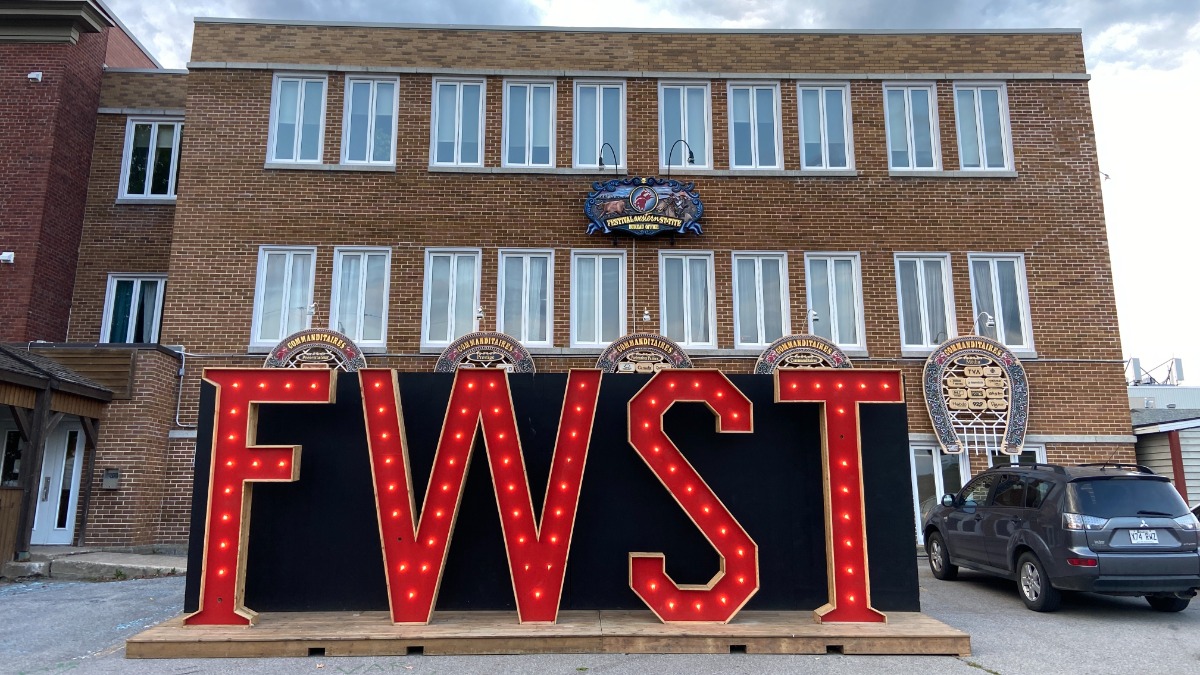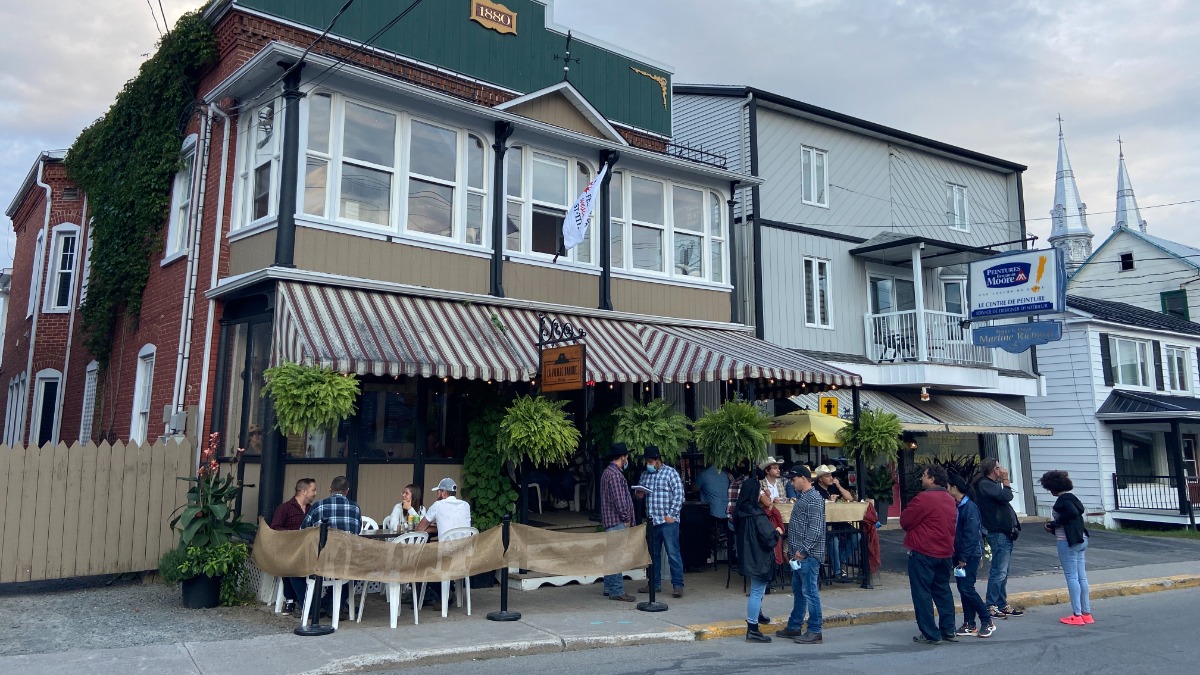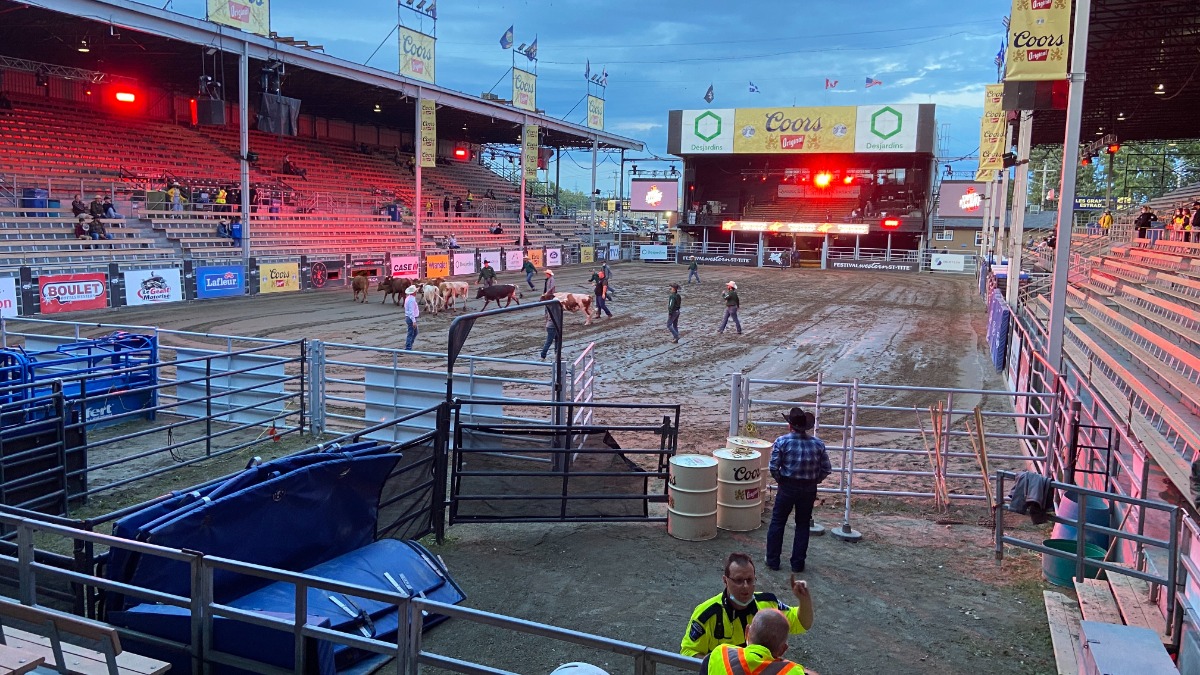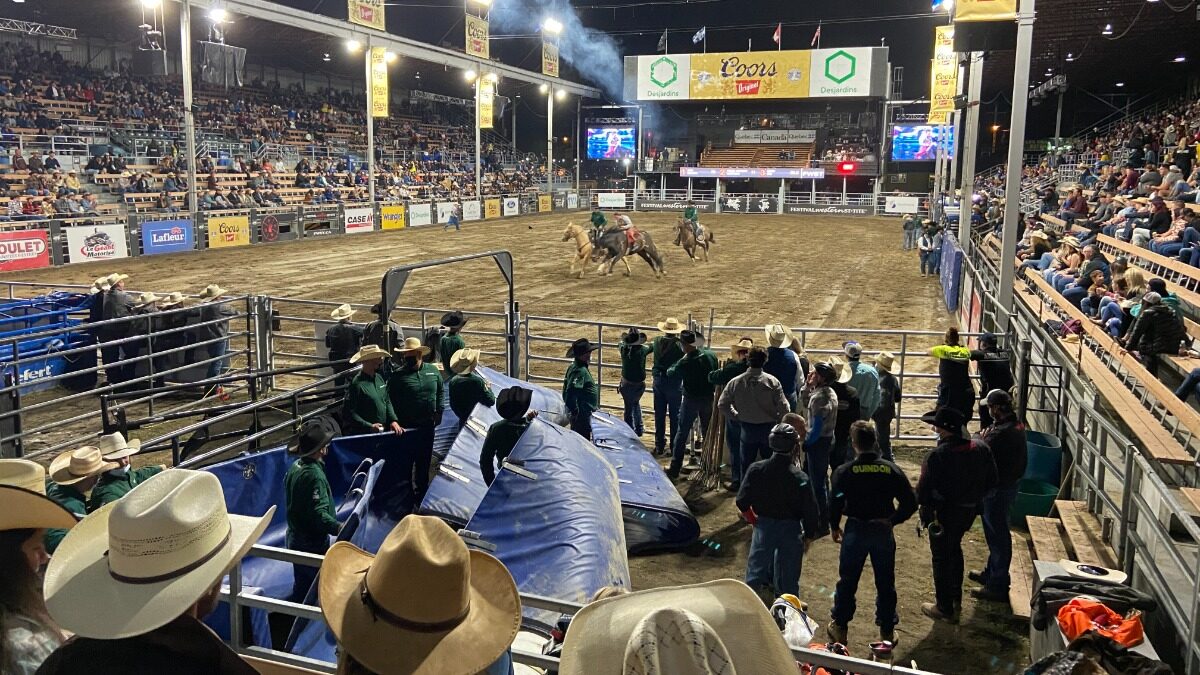After a pandemic-imposed hiatus last year, the 53rd edition of the Festival Western de Saint-Tite returned to Quebec from Sept. 10-19 with strict COVID-19 countermeasures in place.
The 10-day rodeo in Saint-Tite, a town of about 4,000 people 130 kilometres west of Quebec City in the province’s Mauricie region, usually welcomes more than 600,000 visitors a year. This year, pandemic restrictions reduced the number of visitors, but the organizing committee did not record attendance numbers.
“Everyone needs to have their vaccine passport to enter the stands, to access reserved seats. People needed to sit in their bubble and we had a maximum of 2,500 people per rodeo,” said Sylvain Bourgeois, director of rodeo at the Festival Western de Saint-Tite.
COVID-19 measures in place
The Quebec government introduced a vaccine passport on Sept. 1. Certain non-essential businesses need to scan a QR code on patrons’ smartphones to ensure they’ve been adequately vaccinated against COVID-19 before letting them in.
Staff at the festival were checking passports and matching names on smartphone screens to information on provincial ID cards. Festivalgoers from outside Quebec were admitted if they could show proof of vaccination from their province and ID proving their province of residence. Those who were cleared were given a brown paper wristband.
The event was held outdoors so guests weren’t required to wear masks. However, roving beer and snack vendors, security, paramedics and other staff wore face coverings in the grandstands.
According to Bourgeois, rodeo competitors also followed strict public health measures.
“There were a lot of young competitors that hadn’t yet received their second dose, so we had them take 72-hour COVID tests and they had to wear a mask at all times, except for when they were competing,” he explained.
Competitors’ spirits were not dampened despite the additional steps.
“The participants were happy to be able to do their sport after such a long break. This year’s event was primarily held for our competitors and our equine and bovine athletes, so that they could stay in shape,” said Vanessa Denis, communications coordinator for the Festival Western de Saint-Tite.
Bourgeois said all the COVID-19 measures were very well respected and appreciated.
“I didn’t hear any complaints from the competitors. Everyone was just happy to get back to competing. Spectators said we did a good job. Everyone felt safe.”
Sylvain Bourgeois, director of rodeo at the Festival Western de Saint-Tite
“I didn’t hear any complaints from the competitors. Everyone was just happy to get back to competing. Spectators said we did a good job. Everyone felt safe.”
Local business owner Philippe Dumais said public health measures in Saint-Tite were well implemented during the festival. According to Dumais, the Sûreté du Quebec and festival security staff had a visible presence throughout the event.
“People have been very respectful and happy to come to Saint-Tite,” said Dumais.
Impact on businesses
The event was cancelled in 2020 because of COVID-19. Dumais said he wasn’t surprised.
The festival was first held in 1967 in the town’s baseball diamond by a local leather boot factory, G.A. Boulet Inc., as a promotional event. The following year, other local businesses joined in to help organize the event and it eventually became an annual festival. The current grandstands were inaugurated in 1999, replacing the older one from 1972. Today, G.A. Boulet produces more than 200,000 pairs of boots a year and is still at its original location.

It is a major source of tourism income for the community. In 2019, visitors spent $3.8 million and created $600,000 of direct economic benefits to the town, according to their annual report. With the resumption of in-person activities this year, tourist dollars are starting to trickle back into Saint-Tite.
“The fact that there were no kiosks on the streets led visitors to consume more locally, which we encouraged them to do,” said Denis.
Dumais felt this effect. He co-owns À La Fût, a microbrewery in Saint-Tite. He said he wouldn’t have thought that so many people would come with so few activities going on.
“We’re really happy that people are coming for the festival. But seeing as there aren’t many options for restaurants to open, when our restaurant is full, we have people lining up outside.”
Philippe Dumais, local business owner
“We’re really happy that people are coming for the festival. Seeing as there aren’t many options for restaurants to open, when our restaurant is full, we have people lining up outside,” said Dumais.
Even though the festival was back in town, visitor numbers were drastically reduced this year. Some local businesses were feeling pinched as a result.
“For sure there are a lot of businesses in Saint-Tite for whom the festival is an important part of their viability for the year,” said Dumais. “For those businesses, it’s been challenging.”
A dampened vibe
For Bourgeois, having the rodeo back has been a good step towards normalcy and a culturally important move.
“(The rodeo) is important for people whose lifestyle this is. It’s part of their culture. We were raised with horses. I was raised with horses, my father was raised with horses, my grandfather too,” he said. “It’s part of our culture and our heritage.”
Before the pandemic hit, the streets would be flanked with stalls left and right offering food and souvenirs. The event would also typically include other outdoor cultural activities to entertain the huge crowds.
“It was disappointing that they focused the festival only on rodeos, so there were no street activities,” explained Dumais. “Usually, we have shows, big tops, dancing.”
“People like to go on a walk with a beer while listening to music and socializing with each other. It’s really the heart of the event,” he added.

Although only one in ten festivalgoers buy a ticket for the rodeo, Denis missed the kiosks.
“For sure we were disappointed that the festival would be restricted to activities held in the Coors Original Grandstand,” she said. “We understand that this was for the best, to keep everyone safe and healthy.”
A way forward for rodeos
Barbara Poulsen from the Canadian Professional Rodeo Association said she believes rodeos can be held safely during the pandemic “provided each event and everyone involved follow current provincial and community health guidelines and mandates.”
Burgeois knows it’s not an easy feat. Every year, the rodeo is run with the help of 650 volunteers.
“Oh boy. It takes a lot of organizing to be able to have rodeos with all those measures for sure. We were lucky, we had a lot of volunteers to help.”
Sylvain Bourgeois, director of rodeo at the Festival Western de Saint-Tite
“Oh boy. It takes a lot of organizing to be able to have rodeos with all those measures for sure. We were lucky, we had a lot of volunteers to help,” he said.
But he also admits doing this in the midst of a pandemic is a challenge not every rodeo is ready to overcome.

“I don’t know that other organizations in Quebec would be able to organize these competitions with all those public health measures. I know many of them threw in the towel because it was much too expensive and too demanding in terms of the number of staff needed (to comply with COVID-19 countermeasures),” he added
Regardless of the challenges, back-to-normal is still the rodeo’s vision.
“It’s important for us to carry on the tradition in order to keep the country-western culture alive,” said Denis. “We hope to be able to return to how we usually do things.”
The Mauricie et Centre-du-Québec, which includes the city of Shawinigan and lies between Montreal and Quebec City, is home to about 500,000 people.

COVID-19 case numbers for the region ticked upward at the end of July when the Quebec government declared the whole province a green zone, but numbers had remained stable for about a month leading up to the rodeo festival.




